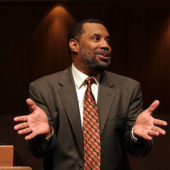It’s time once again for our monthly opportunity to get answers to your questions on the bible, faith, and the church. Professors Mark Muska and Brad Sickler from the University of Northwestern answer your questions about interpreting scripture.
“I don’t want to be flippant about quoting a scripture and using it for that purpose sake; not mentioning the context of that scripture.” –Shannon, Faith Radio listener
Professor Mark Muska notes that this is a wonderful caution for people who don’t know the full context of the scripture they are referring to. He uses the example of Jeremiah 29:11:
“I think your caution is warranted for people who don’t know Jeremiah 29:11. This very popular promise; you see people who have pendants around their neck with Jeremiah 29:11 on it…where God is reassuring Judah, the southern kingdom, that ‘I have a future and a hope for you that for good and not for evil,’ and so many people will apply that promise to their lives and to themselves.” -Professor Muska
Professor Muska encourages us to take another look at the full context of this scripture.
“If you look at the context, God has just been talking about how he’s going to pound the living daylights out of these people because of their rebellion and sin for all these years. Then he says, ‘but after that’s done I am going to renew you because I do have a future and hope for you…I’m going to bring you back to myself.’
When you’re interpreting any kind of passage in the bible, he adds, it’s always healthy to keep the full context in mind.
Similar to Jeremiah 29:11, we learn more about how 1 Samuel 18:10 can be taken out of context if not fully understood.
“I’ve been reading 1 Samuel 18:10 and this is when David has been anointed, the king, yet Saul is still in power and it says, ‘the next day an evil spirit from God came forcibly upon Saul.’ The fact that it comes from the Lord is the troubling part for me, can you give me a little bit of insight here?’” -Pat, Faith Radio listener
How could something evil be from the Lord?
“This kind of is an expression points to the sovereignty of God that He is ruler of all, and that includes evil spirits and Satan himself. He is Lord of all and so He can accomplish His purposes by allowing evil spirits to do what they desire to do.” –Professor Muska
We learn an analogy for ‘unleashing of evil spirits,’ and bringing it into perspective.
“I love using the analogy to say, ‘evil spirits are like a wicked, powerful, mean dog on a leash and God usually restrains them with that leash, and in this case with Saul; He let go of the leash.'” –Professor Muska
There are many different ways to interpret scripture, but our Professors suggest that understanding the scripture in its full context, is a great way to gain understanding and renew your perspective on it.



















